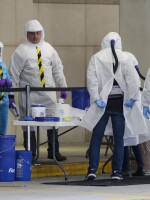The United States is heading into a very sharp downturn in the next three months. That much seems certain.
What is unique this time is that we as a country are willing it to happen.
Collectively — intentionally — we are putting much of the economy on lockdown. The priorities are clear: save lives and keep hospitals and emergency rooms from being overwhelmed. For now, that means America is an economic ghost town.
California's governor was the first to order people in an entire U.S. state to stay home. Other states have followed. Throughout the country, restaurants and bars have closed. Air travel has come to a near standstill.
And most notably, Americans throughout the country have decided on their own to stay home — to protect themselves, their families and their neighbors.
All of these steps are being taken to somehow arrest the spread of the coronavirus. But all of these steps also contribute to a sudden, violent contraction in the economy.
It's like a seesaw.
The measures to protect public health are on one end. The normal activities that generate economic growth are on the other. And right now, we've put our weight firmly on the public health side of the seesaw. Saving lives is the priority.
Jeffrey Sachs, professor of sustainable development at Columbia University, says two immediate steps are critical:
"These are the highest priorities right now," Sachs says. "Everything else — economic ramifications and so forth — have to be secondary because the ferocity of this epidemic is extraordinary."
In the short term, at least, the economic pain will be crushing. Jobless claims are soaring. Millions may be newly unemployed by the end of the month. Small businesses stand on the brink of insolvency as cash on hand runs short. Uncertainty has sent financial markets into a spiral of fear. Goldman Sachs is warning of a jaw-dropping 24% drop in economic activity in the second quarter. JPMorgan Chase predicts a contraction of 14%. If these come true, it's the kind of tailspin that's far worse than any quarter during the Great Recession.
None of this is to say that the government and business leaders are simply letting the worst happen. Steps are being taken to avoid a catastrophic collapse. The Federal Reserve has moved aggressively to limit the damage, slashing interest rates to zero and pumping hundreds of billions of dollars into the financial system to keep money flowing. The Trump administration and Congress are negotiating a rescue plan of more than $1 trillion.
But these moves cannot just flip a switch and quickly restore the economy to where it was a month ago. They are lifelines, not booster shots — help businesses keep the lights on, help people who lose income and jobs pay the rent and feed the kids.
Emergency measures are critical. The economy has shifted to a wartime footing. Massive barrages of money and cheap credit will help, economists say. But the best remedy isn't financial: It's taming the coronavirus.
Copyright 2020 NPR. To see more, visit https://www.npr.org.


